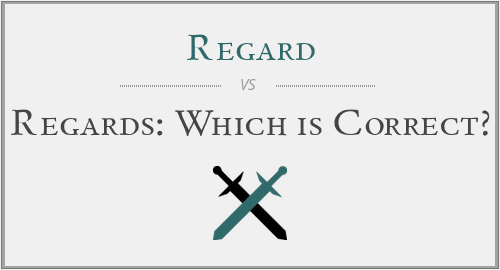
Do I “send you my regard” or “send you my regards”?
Do you end your correspondence “with best regard” or “with best regards”?
"Regard" or "regards." How do we know which one to use?
In this article, I will first define and discuss the word “regard." To further clarify, I will then look at two other phrases that use the word “regard/s.” Finally, I will conclude by summarizing what has been discussed.
The word “Regard” – Definition and Meaning
The word “regard” is both a noun and a verb.
As a noun, the word “regard” comes to us from the mid-14th century Old French “regart, regarder,” meaning “to take notice of.”
The noun form of “regard” is defined as “a feeling of affection, best wishes, a protective interest, esteem, consideration, admiration, respect, motive, care, favor.”
For example:
“Send my regards to your grandmother.” This noun is now plural. We are sending all of our regards to the grandmother.
As a verb, the word “regard” also comes from 14th century Old French “regarder,” meaning “to look at, to heed, to notice, to consider.”
As a verb, its meaning changes from when it is used as a noun. The verb form of “regard” is defined as “to gaze at, to look at, to hold in the highest esteem, to behold, to eye, to discern, to observe, to perceive, to view, to judge.”
So, when using "regard" as a verb, do we say “regard” or “regards”?
It is conjugated like any other verb: that is, “I regard, you regard, he-she-it regards, we regard, they regard.”
For example:
“I critically regarded my steak to make sure that it is well done.”
Two Other Phrases that Use the word “Regard.”
The phrase “in regard/s to” is a prepositional phrase from the mid-15th century which introduces or refers to the central topic. It means “concerning, about, on the subject of.”
For example:
“In regards to” is used in casual speech and written examples are harder to find, whereas “in regard to” can be found in more formal writing.
Many grammarians frown on the use of “in regards to,” finding it the inferior phrase. To avoid its use, the phrase, “in regard to” can be used exclusively. Or the issue can easily be avoided by using a simple single word preposition that means the same thing, such as “regarding.”
Using "regards" in this case is considered acceptable, although many people feel it is inferior.
For example:
*“With regards to” also means “sending well wishes to someone." Using "regards" with this meaning is considered correct.
For example:
“Give our regards to Mary; we haven't seen her in such a long time.”
Final Thoughts
We have seen that there are three separate meanings related to “regard.” They each require consideration when choosing whether to use an “s” or no “s.”
1. When the word is a noun, you can use both “regard” and “regards.”
The singular “regard,” the plural “regards,” and the phrase “with regards” all mean “esteem, respect, best wishes.”
2. When the word is a verb, you can use both “regard” and “regards.”
Although traditional grammarians insist that the proper use of the word is without an "s," in today’s modern world, we hear “regards” used by credible speakers; it can be found in literary works and edited newspaper articles, as well.
A Practical Tip: If you want to be on the safe side in these instances, just use the word “regarding” and forget the rest.




Have a discussion about this article with the community:
Report Comment
We're doing our best to make sure our content is useful, accurate and safe.
If by any chance you spot an inappropriate comment while navigating through our website please use this form to let us know, and we'll take care of it shortly.
Attachment
You need to be logged in to favorite.
Log In